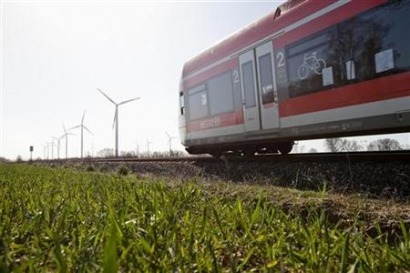
It is well known that Germany has long been a leader in renewable energy, and with the strong commitment shown by German companies such as Deutsche Bahn (DB), this leadership is likely to continue. Indeed, DB bills itself as the "biggest consumer of green energy" in Germany.
The German national railway operator recently signed a 15-year hydro-electric supply contract worth €1.3 billion with power company RWE, as part of its on-going effort to ramp up its renewable energy use to 28% by 2014. The contract covers the period from 2014 to 2028 and is to involve output from 14 hydro-electric generating plants.
"Consumers in Germany have made it clear they want us all to get away from nuclear energy and to more renewable energy," Hans-Juergen Witschke, Chief Executive of Deutsche Bahn Energie, told Reuters in a recent interview. "It's what customers want and we're making it happen. The demand for green electricity keeps rising each year and that'll continue."
RWE is to supply the railway operator with about 900 million kilowatthours of electricity per year, enough to run about one third of the DB's long distance trains for a year. The same quantity would supply 250,000 German households for a similar period.
""With this move, we are getting closer to our vision of meeting all the railways' electricity needs with renewable energy by 2050," DB Chairman, Ruediger Grube, said in a recent statement.
Response to nuclear phase-out
DB’s latest decision to boost its renewable energy use comes off the back of the German government’s decision to reverse its stance on nuclear power, shutting eight plants and announcing the closure of a further nine plants over the next 20 years. The news put DB in a difficult position, since its railways alone use 2 percent (12 terawatt hours) of Germany's total electricity, much of which comes from nuclear power.
Environmentalists have applauded DB’s stance on forming partnerships with wind and hydroelectric power suppliers and its moves towards generating electricity using solar panels installed on the roofs of its stations, such as the array on the roof of Berlin's main station, which produces 160,000 kw/h of electricity a year (covering about 2 percent of the Hauptbahnhof station's demand). DB also operates two wind farms in Brandenburg.
Witschke believes this latest deal with RWE has "quite a symbolic impact” given that his company, which is the largest electricity user in German, has taken “such a big step into regenerative energy".
"We're also one of the biggest electricity users anywhere in Europe. It's not going unnoticed,” he said.
RWE, which is the second biggest German power group, is working to build up its capacity to produce more renewable energy to meet the demands of customers such as DB as the government phases out nuclear power. By 2013, RWE says it will have invested almost €4 billion in expanding its alternative energy production capacity.
For additional information:

